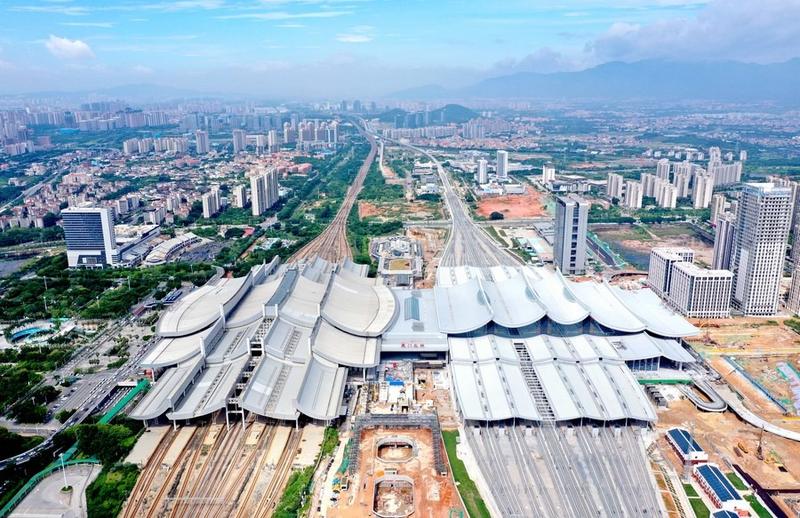 This aerial photo taken on June 19, 2023 shows the newly built part of Xiamen North Railway Station on the Fuzhou-Xiamen high-speed railway in Xiamen, Fujian province. (PHOTO / XINHUA)
This aerial photo taken on June 19, 2023 shows the newly built part of Xiamen North Railway Station on the Fuzhou-Xiamen high-speed railway in Xiamen, Fujian province. (PHOTO / XINHUA)
Meeting sees need to enhance market access, improve business environment
Chinese President Xi Jinping stressed the importance of building a new system for a higher-standard open economy at a key meeting on Tuesday.
Xi, who is also general secretary of the Communist Party of China Central Committee and chairman of the Central Military Commission, made the remarks while presiding over a meeting of the Central Commission for Comprehensively Deepening Reform under the 20th CPC Central Committee.
Xi, who is head of the commission, called for greater institutional opening-up in key areas of international exchange and cooperation, such as investment, trade, finance and innovation.
READ MORE: China to advance pilot free trade zones' opening-up
He also said that efforts must be made to further reform systems and mechanisms and refine relevant policies and measures in order to bring China's level of opening-up to new heights.
The meeting said that it is necessary to perfect top-level design of the new system, expand market access and improve the business environment in the country.
China must fully leverage its comprehensive advantages, attract global resources by promoting domestic circulation and enhance the quality and level of its trade and investment cooperation, the meeting's participants said.
They also called for the building of a new system of an open economy at a higher level to be closely integrated with the Belt and Road Initiative and other national strategies.
Policymakers at the meeting also stressed the need to reform the salary system in colleges, universities and research institutes in an effort to encourage innovation
The meeting also adopted a policy document to promote the gradual transition from dual control over the amount and intensity of energy consumption to dual control over the amount and intensity of carbon emissions.
ALSO READ: Financial opening-up keeps gathering steam
It was noted at the meeting that persistent efforts must be made to create the conditions for this transition and to strike a balance between development and carbon emission reduction according to the actual situation.
Since the 18th National Congress of the CPC in 2012, China has prioritized the pursuit of green and low-carbon development, leading to a sharp increase in the country's energy use efficiency and the continuous reduction of carbon dioxide emissions.
The country has set a target of hitting peak emissions before 2030 and achieving carbon neutrality before 2060.
Policymakers at the meeting also stressed the need to reform the salary system in colleges, universities and research institutes in an effort to encourage innovation.
Salary distribution must be closely related to performance and tilt toward those who are deeply engaged in teaching and scientific research and those making outstanding contributions to difficult and crucial tasks, they said.
READ MORE: Tesla chief briefed on benefits of opening-up
They also said that those who are engaged in teaching fundamental disciplines and conducting cutting-edge research, and those making breakthroughs in core technologies in key fields should be better supported in terms of the salary system.
The meeting's participants underscored the importance of strengthening supervision of salary management to ensure that country's funds are used where they are most needed.
The meeting's participants called for efforts to further reform systems related to the gas and oil market, step up market supervision, regulate market order and promote fair competition.
It is important to deepen the reform of the oil and gas reserve system and make good use of the emergency and regulatory capabilities of the reserves, they said.
Li Qiang, Wang Huning and Cai Qi, who are members of the Standing Committee of the Political Bureau of the CPC Central Committee and deputy heads of the commission, attended the meeting.


